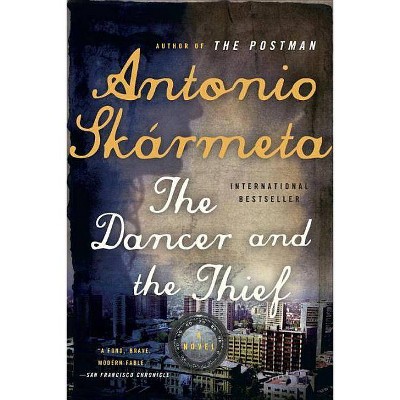Woman in Battle Dress - by Antonio Benítez-Rojo (Paperback)

Similar Products
Products of same category from the store
AllProduct info
<p/><br></br><p><b> About the Book </b></p></br></br>An epic, historical novel about a bold, transgressive woman whose life became the subject of Cuba's most sensational legal trial.<p/><br></br><p><b> Book Synopsis </b></p></br></br><p><b>Finalist for the 2016 PEN Center USA Award for Translation</p></b><br><p>In 1809, at the age of eighteen, Henriette Faber enrolled herself in medical school in Paris--and since medicine was a profession prohibited to women, she changed her name to Henri in order to matriculate. She would spend the next fifteen years practicing medicine and living as a man.</p><p>Drafted to serve as a surgeon in Napoleon's army, Faber endured the horrors of the 1812 retreat across Russia. She later embarked to the Caribbean and set up a medical practice in a remote Cuban village, where she married Juana de León, an impoverished local. Three years into their marriage, de León turned Faber in to the authorities, demanding that the marriage be annulled. A sensational legal trial ensued, and Faber was stripped of her medical license, forced to dress as a woman, sentenced to prison, and ultimately sent into exile. She was last seen on a boat headed to New Orleans in 1827.</p><p>In this, his last published work, Antonio Benítez Rojo takes the outline provided by historical events and weaves a richly detailed backdrop for Faber, who becomes a vivid and complex figure grappling with the strictures of her time. <i>Woman in Battle Dress</i> is a sweeping, ambitious epic, in which Henriette Faber tells the story of her life, a compelling, entertaining, and ultimately triumphant tale.</p><p><b>Praise for <i>Woman in Battle Dress</i></b></p><p><i>Woman in Battle Dress</i> by Antonio Benítez-Rojo, which has been beautifully translated from the Spanish by Jessica Ernst Powell, is the extraordinary account of an extraordinary person. Benítez-Rojo blows great gusts of fascinating fictional wind onto the all but forgotten embers of the actual Henriette Faber, and this blazing tale of her adventures as a military surgeon and a husband and about a hundred other fascinating things is both something we want and need to hear.--<b>Laird Hunt</b>, author of <i>Neverhome</i></p><p>A picaresque novel starring an adventurous heroine, who caroms from country to country around the expanding Napoleonic empire, hooking up with a dazzling array of men (and women) as she goes. A wild ride!--<b>Carmen Boullosa</b>, author of <i>Texas: The Great Theft</i></p><p>As detailed as any work of history and as action filled as any swashbuckler, Woman in Battle Dress is not only Antonio Benítez Rojo's last and most ambitious book, but also his masterpiece. In this graceful English translation of Henriette Faber's autobiography--more than fiction, less than fact--American readers will have access to one of the most engaging novels to come out of Latin America in recent years.--<b>Gustavo Pérez-Firmat</b>, Columbia University</p><p><b>Antonio Benítez-Rojo</b> (1931-2005) was a Cuban novelist, essayist and short-story writer. He was widely regarded as the most significant Cuban author of his generation. His work has been translated into nine languages and collected in more than 50 anthologies. One of his most influential publications, <i>La Isla que se Repite</i>, was published in 1989 by Ediciones del Norte, and published in English as <i>The Repeating Island</i> by Duke University Press in 1997.</p><p><b>Jessica Powell</b> has translated numerous Latin American authors, including works by César Vallejo, Jorge Luis Borges, Ernesto Cardenal, Maria Moreno, Ana Lidia Vega Serova and Edmundo Paz Soldán. Her translation (with Suzanne Jill Levine) of Adolfo Bioy Casares and Silvina Ocampo's novel <i>Where There's Love, There's Hate</i>, was published by Melville House in 2013. She is the recipient of a 2011 National Endowment for the Arts Translation Fellowship in support of her translation of Antonio Benítez Rojo's novel <i>Woman in Battle Dress</i>.</p><br><p/><br></br><p><b> Review Quotes </b></p></br></br><br><p>A fascinating novel, in a brilliant translation, about the unique fate of Henrietta Faber who played a gender-bending role in the history of Cuba.--Suzanne Jill Levine, noted translator and author of <i>Manuel Puig and the Spider Woman: His Life and Fictions</i></p><p>Very few novels dare to explore the historical representation of women to the extent that <i>Woman in Battle Dress</i> does, with impeccable veracity and bravado. The idea that a woman must pretend to be a man in order to become a physician, and is then punished by being forced back into a woman's identity, only to escape to New Orleans as a fictional character, works as a Stendhal novel in reverse. Napoleonic France and the colonial Caribbean are chartered by men; New Orleans is extraterritorial, ready for a new saga. A true Doña Quijota, Henriette Faber takes on these roles to gain her freedom in a novel, the only modern space larger than life.--Julio Ortega, Professor at Brown University, author of <i>Transatlantic Translations</i></p><p>Reviving the Renaissance and Baroque figure of the virago, in Spanish Golden Age theater the mujer varonil, Antonio Benítez Rojo creates a fascinating woman protagonist who dresses and acts like a man, mostly as a qualified medical doctor, while participating in major historical events in Europe and the Caribbean. The reader's attention is captivated by the suspense generated by the fear that her true sex will be discovered, and entertained by her wiles in trying to prevent it. <i>Woman in Battle Dress</i> is a rich and engaging historical novel.--Roberto González Echevarría, Sterling Professor of Hispanic and Comparative Literature, Yale University, author of <i>Modern Latin American Literature: A Very Short Introduction</i></p><p>"Henriette Faber's life seems tailor-made for fiction. A Swiss orphan who disguised herself as a man, studied medicine in Paris, and served as a surgeon in Napoleon's Grand Armée during France's invasion of Russia in 1812, she later worked as a doctor in Cuba, where her identity was discovered only after she married another woman. In his impressive, hugely enjoyable final novel, the late Benítez-Rojo revivifies this little-known figure and recognizes her as an early champion of gender equality. Presented mostly chronologically, Henriette's first-person account offers the complexity of an old-fashioned adventure narrative, packed with history and incident, yet is told with a candid, modern voice. Shaping her chronicle as she wishes, she stitches together numerous episodes, moving from her romance with a dashing Hussar to her picaresque journey with a traveling show, and spends significant time on Napoleon's military victories and disasters, including the horrific retreat from Moscow. Details form Caribbean history are interwoven throughout, and through Henriette's eyes, the author also addresses the economic factors that kept slavery alive in his native land."--<i>Booklist</i></p><p>This historical novel elaborates on the true story of Henriette Faber, a woman who assumed a man's identity in order to practice medicine in Cuba, where her identity was outed with disastrous results. Rojo, who defected from the island in 1980 after running the state-sponsored publishing house Casa de las Américas for years, is best known here for a collection of essays and literary criticism on the Caribbean, <i>The Repeating Island</i>. He gives his protagonist an irrepressible free spirit, which forces her to test the boundaries of sexual practice, identity, and nationalism of her time. Under this first-person adventure story, a somber question lingers: What's the limit to the freedom you can write into your own life?"--Alexia Nader, <i>OZY</i></p><p>Benítez-Rojo's clear writing breathes life into this woman's story."--<i>World Literature Today</i></p><p>Using the sparse historical records, [Benítez-Rojo] has skillfully reconstructed Henriette/Enriqueta's not-widely-known life story. The exquisitely detailed chronicle, written in the first person and seamlessly translated by Jessica Powell, is a fascinating read. We are taken along with Henriette on her epic journey, hear her thoughts, and observe the joys and pains she experiences while growing up, attending grand balls, having adventures on the battlefield, dealing with slaves, and practicing medicine in the demanding disguise of a man. ... This is a valuable addition to existing stories about courageous gender-bending women, and as such it is highly recommended."--<i>The Historical Novels Review</i></p><p>"Segments of [<i>Woman in Battle Dress</i>] flow seamlessly from romance to history to picaresque to almost magical realism, and back again. And while the novel takes place mostly in Europe and the United States, the Caribbean accent is always present. In some ways you could be reading a novel written two hundred years ago. The romanticism, the dense unhurried prose, are all there, and Jessica Powell's translation beautifully captures the style and voice of the original. Precisely because it is so unobtrusive, this translation is so worthy of praise."--<i>Metamorphoses</i></p><br><p/><br></br><p><b> About the Author </b></p></br></br><b>Antonio Benítez Rojo</b> (March 14, 1931 - January 5, 2005) was a Cuban novelist, essayist and short-story writer. He was widely regarded as the most significant Cuban author of his generation. His work has been translated into nine languages and collected in more than 50 anthologies. <p/>Born in Havana, he lived in Cuba with his mother and stepfather from the age of seven. In the mid-1950s, backed by United Nations grants, Benítez-Rojo studied statistics at the United States Department of Labor and Commerce, and later studied in Mexico. Turning down offers to work in Chile or Geneva, he returned to Cuba in 1958 and became head of the Statistics Bureau at Cuba's Labor Ministry. <p/>Benítez-Rojo began working at the Ministry of Culture in 1965 and won the Premio Casa de las Américas for the short story collection <i>Tute de reyes</i> in 1967. The following year, he won a writers' union prize of a trip to a socialist country; however, the government did not permit him to leave Cuba. <p/>By 1975, Benítez-Rojo had been made head of Casa de las Américas, the publishing house run by the Cuban government. <i>Sea of Lentils</i>, the English translation of his novel <i>El mar de las lentejas</i>, was selected by the <i>New York Times</i> as one of the Notable Books of 1992. In 1980, he was given permission to attend a conference at the Sorbonne in Paris. He traveled from Paris to Berlin, obtained a US tourist visa, and came to the United States, where he joined his wife and children (who had self-exiled years before), and became a professor of Spanish at Amherst. <p/>One of his most influential publications, <i>La Isla que se Repite</i>, was published in 1989 by Ediciones del Norte, and published in English as <i>The Repeating Island</i> by Duke University Press in 1997. Benitez-Rojo died in 2005. <p/><b>Jessica Powell</b> has translated numerous Latin American authors, including works by César Vallejo, Jorge Luis Borges, Ernesto Cardenal, Maria Moreno, Ana Lidia Vega Serova and Edmundo Paz Soldán. Her translation (with Suzanne Jill Levine) of Adolfo Bioy Casares and Silvina Ocampo's novel <i>Where There's Love, There's Hate</i>, was published by Melville House in 2013. She is the recipient of a 2011 National Endowment for the Arts Translation Fellowship in support of her translation of Antonio Benítez Rojo's novel <i>Woman in Battle Dress</i>.<br>
Price History
Price Archive shows prices from various stores, lets you see history and find the cheapest. There is no actual sale on the website. For all support, inquiry and suggestion messagescommunication@pricearchive.us




















